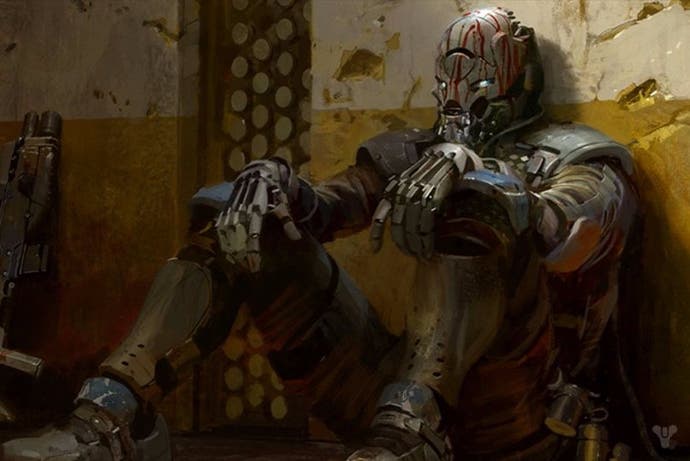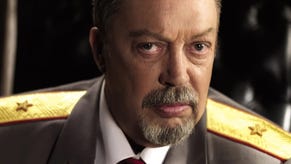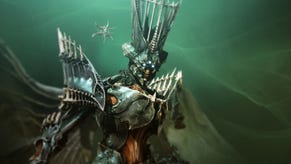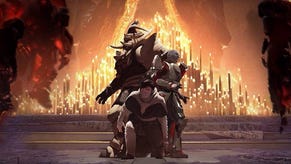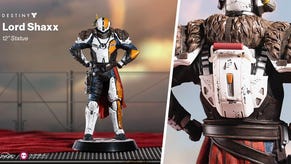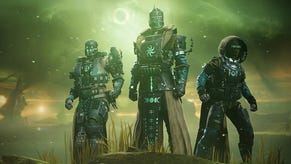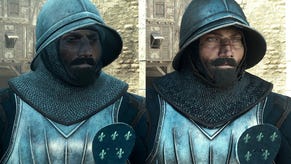The day the music died: When Bungie fired Marty O'Donnell
"I wish it hadn't happened."
In February 2013, Bungie invited the world's press into its Bellevue, Washington studio to show Destiny for the first time. Except the studio didn't show Destiny. Rather, it talked about Destiny.
In its in-house theatre press were treated to multiple presentations, each focusing on a different aspect of the game's development. We had an overview, a message from Activision Publishing boss Eric Hirshberg (who, then and there, described Destiny as a "shared-world shooter"), a tech talk and a PowerPoint packed with very impressive concept art.
And then Marty O'Donnell came out to talk about the music.
Marty O'Donnell, one of video game's most famous composers, creator of the famous Halo monk chant, asked for the lights to be dimmed. Then he suggested those in attendance close their eyes, as if to heighten the other senses. There followed excerpts of Music of the Spheres, what was then planned to be the groundbreaking musical prequel to Destiny, a near hour long body of work O'Donnell had worked on for two years. It reverberated around the room. I remember thinking, at the time, that the music was great. That it was instantly recognisable as coming from the person who composed Halo's music. But still, I'd prefer to see Destiny in action, with, you know, gameplay.
Just over a year later, Bungie fired Marty O'Donnell. He announced the news with a bombshell tweet: "I'm saddened to say that Bungie's board of directors terminated me without cause on April 11, 2014." Halo fans the world over gasped in shock. Bungie's most popular grizzled ancient was out, and Destiny's 10-year plan was thrust into chaos.
Now, in April 2016, just as Bungie releases a significant update to Destiny designed to tide increasingly restless players over until the launch of a proper expansion later this year, Marty O'Donnell's first Kickstarter has just been funded. Echoes of the First Dreamer is the musical prequel to PlayStation VR game Golem, the first title from new studio Highwire Games, which O'Donnell, alongside fellow ex-Bungie developer Jaime Griesemer, co-founded following his acrimonious exit. A coincidence, perhaps, that O'Donnell's Kickstarter ends as Destiny begins anew. I wonder if Bungie and Activision see the funny side.
O'Donnell has spent this past year fighting a messy lawsuit with Bungie over his exit. It's been covered extensively, and court documents made public shine a light on the dispute between once great friends. Clearly, it was a difficult breakup. What were once great friendships are now left in tatters.
O'Donnell, buoyed by the success of his Kickstarter and the promise that at least one musical prequel to a video game he's worked on will see the light of day, looks to the future. But there is still much about this high-profile video game split to discuss, such as that February 2013 press event, with the dimmed lights and the closed eyes and Music of the Spheres.
"At that moment, I wasn't anticipating that some of the challenges I was feeling in the leadership in Bungie could ever grow to such a large degree," O'Donnell says over Skype from the studio he built in his home - a far cry from his former Ivory Tower audio installation inside Bungie's gargantuan open plan office.
"At that moment there were hints of things. To me at the time they just seemed like normal creative differences that were not severe - they were just different ways of looking at things. And also some business level differences I thought were just like, well here I've got some insights that seem to be slightly different than others' insights, and I'm sure we'll work these things out.
"So at that point, February 2013, I was still extremely hopeful that whatever small differences or different paths we were starting to go on would converge again soon."
In 2011 Marty O'Donnell began work on what turned out to be Music of the Spheres, after then Bungie COO Pete Parsons asked him to make music for Destiny. There wasn't much to Destiny back then. O'Donnell had the concept of the Traveller, this mysterious spherical being that protected the last city on earth, as a jumping off point. His idea was to take inspiration from the ancient philosophical concept of "Musica universalis", which revolves around the movement of celestial bodies. Paul McCartney - infamously, among Destiny fans - collaborated, much to O'Donnell's delight. O'Donnell's friend Mike Salvatore also helped.

Music of the Spheres was pretty much complete by the end of 2012. The plan was to use the album to help unveil Destiny to the world throughout the following year. Indeed, according to O'Donnell, it was supposed to be released just a few weeks after that February 2013 event. That never happened.
At the time, many within Bungie already suspected Destiny wasn't coming along quite as well as they'd hoped, and it looked inevitable that the game would miss an internal but never announced September 2013 launch window. Activision didn't seem particularly confident, either. Perhaps that's why the February preview event failed to show off the game in any meaningful way.
"If you felt there was a little smoke and mirrors show going on there, that's potentially correct," O'Donnell says.
"There was some fear and trepidation among those of us at Bungie that, okay it's time for us to get out there and tell people what we're doing, but there are parts of this game that just aren't ready to show yet, and how are we going to cover that over and entertain people even though we don't have the whole thing we'd like to show? We knew we were going to take a hit on that.
"To some extent we were hoping, hey but look over here, there's music with Paul McCartney! I was certainly legitimately excited about what I'd been working on for the previous two years and very excited to show it. But I wish we had more progress on the game and were able to show how the game played.
"It was getting very plain at that time to those of us in the studio there was no way we were going to be shipping this in the next nine months."
And then the straw that broke the camel's back: Destiny's big E3 2013 trailer. As you can see, it's Destiny gameplay, but with nondescript music and a similarly nondescript voice over. If you're thinking that doesn't sound very Bungie, you'd be right. The audio was entirely Activision's work.
O'Donnell was incensed.
"I think we have a tacit agreement with the fans that when we show the fans something we're showing them Bungie's work," he says.
"There are some trailers we agree will be outsourced. The plan was not to have the official E3 trailer be outsourced or be worked on without us being super intimately involved, which would have meant at a minimum for me, our actors, our writing, our music, our sound design, our mix.
"Certainly we would have no problem partnering with other creative outside groups to assist us. But that wasn't what Activision wanted to do on the trailer. They felt they had the business and contractual right to make those decisions."
Bungie's board of directors, of which O'Donnell was a member, agreed, and issued a veto letter to Activision in protest. Activision, as publisher of Destiny and source of the cash that was powering its development, overruled the veto.
"At that point I felt we were all pretty unified," O'Donnell remembers. "I thought we had to make it abundantly clear to our fans that that particular piece was made by Activision, and not by us. I didn't know how to say that in a way that probably would've been anything other than messy. But I didn't think it was my job to figure out a way to sell that. I just thought it was the right thing to be truthful with the fans. I thought, this Activision trailer can go up all over the internet. That's fine. But it doesn't need to be on the front page of Bungie.net.
"That was the beginning of the internal conflict."
Then O'Donnell did something that changed things: amid the din of E3 2013, or, the big video game show at which Destiny was set to star, the big video game show Bungie staff had spent a fortnight working 80 hour weeks preparing for, he tweeted to point out the Destiny trailer with Activision's audio did in fact contain Activision's audio.
An overreaction, perhaps?
"If I had to do it over again, would I have made those tweets? Would I have made as big a deal out of it as I felt? I'm not sure," he says. "I don't know.
"What I told the other board members at the time was that I wasn't going to say anything pro-actively about what this was. But if I was asked by the fans about that trailer and the music in the trailer, I would tell them the truth. That's what I did. I was asked by the fans, hey, where's that music? Can we get that music? I had to finally just say, the trailer that was made was made by Activision and not by Bungie. That was what I tweeted.
"Believe it or not it didn't make a big splash! It had something like 12 likes and three retweets."
The tweet might not have made much of an impact on social media, but it shook the foundations upon which Bungie was built. Court documents reveal Bungie's top brass were worried O'Donnell had "hurt the Bungie team, hurt the game, drove a negative online discussion, and violated [Harold] Ryan's [then president of Bungie] instructions". Activision advised Bungie that O'Donnell's conduct may constitute a breach of the parties' contract. There was also a suspicion that O'Donnell was more focused on publishing his Music of the Spheres work than taking the best interests of Bungie into consideration. It was pretty messy.
"The other board members at Bungie were not happy," O'Donnell admits. "Activision wasn't happy. Some of my friends at Bungie were like, well of course Marty was going to do that. Was that a surprise to anybody? I just thought it was a small thing to do, to say, hey, this wasn't something we were happy about and that's what happened."
The run-up to Destiny's big E3 2013 showing was particularly difficult for Bungie, O'Donnell says, with staff working long and hard to get ready for the event. Tensions were running high.
"There was a lot of creative and business pressure on us," he says. "I was frustrated that we had got to the point of one of the biggest moments in our Destiny process, and I was hearing library music. This music had nothing to do with Led Zeppelin. It was music from a music library. It was actually music I heard on another movie trailer. To me it was like, oh my gosh, this is not Destiny music.
"The voiceover wasn't one of our voices. The writing wasn't our writing. The final mix wasn't our final mix. It just felt counterfeit to me. We had that tacit agreement with the fans: if you see a thing that says made by Bungie, it means it was made by Bungie. And I didn't feel like that one was."
All this culminated a week before E3 was set to begin.
So why did Activision assume direct control over Destiny's E3 2013 trailer? I've asked the publisher for comment and will update if it decides to respond. For now, O'Donnell offers his own explanation:
"Activision I believe was doing what they felt they needed to do. They were in charge of marketing and making sure everything was polished," he says.
"There were reasons why Bungie might not have been hitting all of the milestones for all the different pieces Activision felt needed to be shown at E3. There were gameplay issues at that point, of course, because we were a long way from shipping. There were difficulties getting polished visuals captured from the engine. Things were being pushed out. We were trying to do all this work simultaneously, and also have a live gameplay demo to show. There was a lot of pressure on the team and a lot of work going on.
"I think to a certain extent Activision probably felt the pressure, too. They were like, where is this piece that needs to be a keystone of the campaign? And it wasn't coming along as fast as they wanted. There was a point where they made the decision that it wasn't coming along as fast as they wanted, so they were going to take control.
"That to me was the beginning of some struggle between Bungie and Activision. That came out at the trial and the court documents. It's not a giant surprise. In hindsight I can see why there was some fear there, that we were going to miss some deadlines. Maybe they thought they were taking the pressure off by taking that one out of the queue for us to work on."
Whatever the case, O'Donnell's tweet marked the beginning of the end for his time at Bungie. According to court documents, Harold Ryan recommended O'Donnell be fired. He wasn't fired, but his conduct was considered "unacceptable" in his performance review. O'Donnell objected to the review, but the writing was on the wall.
"Because I broke ranks that could be deemed a fireable offense," he says. "Not everybody agreed with that. I didn't know that discussion was happening until much later. I was seriously thinking that maybe this wasn't something I could continue doing. Maybe my age or my stubbornness or whatever was making it so this isn't something I was going to be able to continue doing. I had to think about it for a bit."
But, O'Donnell insists, he redoubled his efforts and "worked hard" to finish Destiny. The trouble was, Destiny wasn't even close to being finished.
According to court documents, in August 2013 Destiny's story was substantially revised and its release date was pushed back to March 2014. Kotaku published an excellent report into how Destiny changed as a result of this drastic revision. The upshot is this: the story, as it was, was ripped to shreds, and Destiny had to be stitched back together. The result people got to play was roundly criticised.
"I started seeing people I was used to working with, from designers to writer Joe Staten, to artists, who were just no longer part of the team," O'Donnell remembers.
This late reset, which, O'Donnell says, was a backwards step so significant it could be considered a return to pre-production in many areas of the game, "affected everybody".
"It affected me, it affected the audio team, it affected designers. Everybody. It was a big big deal. It meant there was not only a lot of work to do, but we were going backwards.
"If you go back to pre-production at that late of a stage, suddenly we need to do some pickup lines. Now we're talking about writing again. We thought we were at the polish stage, but instead we need to go out and write new lines and get some pickups. If that's only 10 per cent or five per cent of the script, that's doable. Once you get into the 50, 60, 70, 80 per cent of the script, that is a much bigger reset. That's taking a huge step backwards, and there's just a tonne of work to do.
"If you're also complicating that with things like performance capture, motion capture, actors who are all over the world, and outside facial animation people, so much ends up being affected when you do any fundamental changes. It was a big deal and it affected a lot of people."
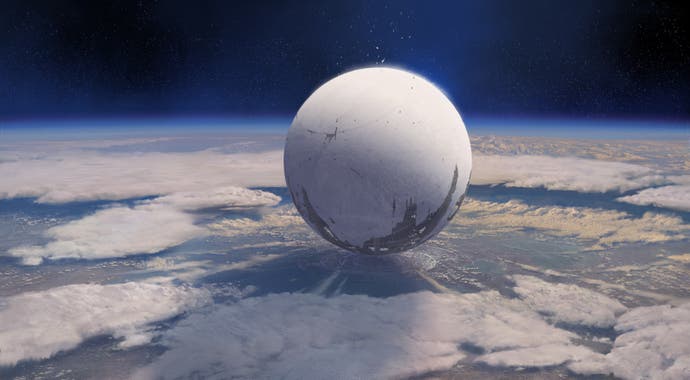
While some within the studio felt Destiny's dramatic about turn was manageable, O'Donnell thought there were better ways of handling the change. O'Donnell thought such a drastic change wasn't necessary, that it would have been better to adjust the work that had been done and fill in the blanks.
"I wasn't alone in that," he says "There were others who agreed that would be a better way to go. But that's not what the leadership wanted to do. And that's the way that went.
This was another point on which O'Donnell butted heads with his fellow board members. "Once again I found myself diverging, this time from a production and creative standpoint, where I'm the odd man out again, at least among the leaders, on what's the best way to fix something."
The elephant in the room is the issue of Activision's growing influence over Destiny's development. Destiny, remember, is Bungie's intellectual property. It owns the franchise. And so its deal with Activision is for the mega publisher to do just that: publish. This is not a Call of Duty situation. At least, it wasn't supposed to be.
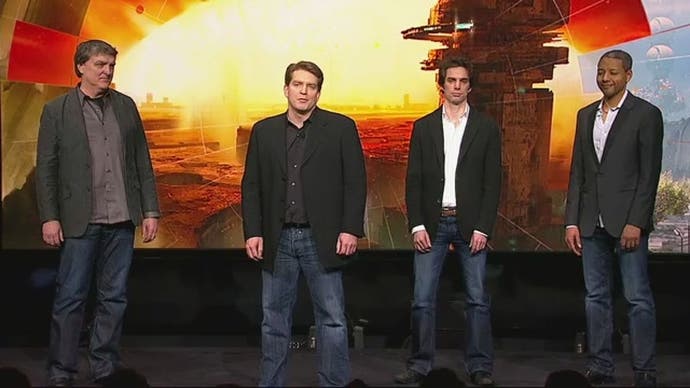
As much as the established narrative suggests Activision forced Bungie to make Destiny more palatable to the Call of Duty audience, O'Donnell won't go as far as to agree with the sentiment. Rather, he says, the dispute at least from his point of view was more a matter of principle.
"One of the fundamental splits between me and other people who were making business decisions at Bungie had to do with this idea of what was our deal with Activision?" he says.
"Our deal with Activision was, they were the publisher and we were the developer. I felt like it was our job to continue to be a developer that was in control of the kinds of things Activision was depending on us to be in control of. Activision is a publisher that's very used to owning the intellectual property and being in close control of the developers. So to a certain extent there was a difference in expectations."
This "difference in expectations" was a by-product, O'Donnell suggests, of a studio culture established years earlier, when it was owned by Microsoft and working on Halo. Then, even though the developer was, essentially, a group of Microsoft employees, it operated almost autonomously, and in a very different fashion to other Microsoft developers. Bungie, O'Donnell is saying, was used to doing things its own way. Maybe it was hubris, he suggests.
"Now we were an independent development company that owns the intellectual property, and we were working with a publisher who was willing to give us a really huge amount of money," O'Donnell says.
"It was our job to figure out how to make all that money back, plus. To me, that seemed like a great deal. As a member of the board, I was pushing to make sure we kept that intact and kept those boundaries intact. I felt it was our job to do everything we knew how to do to make the game really good, and let Activision do all the things it knows how to do to sell the game. To me there are areas that are clearly bounded between those two functions. My ideas were not necessarily the same as Activision's ideas. And it turns out not necessarily the same as other people's ideas on the board at Bungie."
After E3 2013, O'Donnell returned to work after a vacation, but, according to court documents, the audio team and his supervisor did not consider him to be fully engaged in his work. Meanwhile, Destiny was delayed again, this time to September 2014 - a year later than set out in the contract Bungie had signed with Activision.
Bungie, court documents say, set in motion a process to terminate O'Donnell. Members of the team complained that O'Donnell wasn't contributing as expected, and his presence was frustrating the completion of the audio work. Harold Ryan proposed to the Bungie board that O'Donnell be terminated.
Marty O'Donnell remembers, vividly, every detail about the day he was fired. It was Friday, 11th April 2014. He wasn't sure if that would be his last day, but he knew it may be. Discussions about his departure had begun a month before, in March. "The discussions we were having made it pretty abundantly clear to me that the gulf between us was just not going to be bridged in any happy way," he says.
Over the course of the month he brought home personal items he had at his studio: pictures on the wall, little tchotchkes and memorabilia. By the final day there was almost nothing left in his studio to take home.
And yet he harboured some hope that actually, this would all work itself out, and he'd speak with someone who'd say, actually, this is ridiculous, let's be friends again. "In my mind I was hoping we'd have this discussion and we'd figure out a new happy thing and I'd bring back all my tchotchkes," he says.
"That turned out to not be the case."
A morning coffee meeting turned out to be a formal you're fired meeting. It was the first time O'Donnell had been fired.
"It was a little bit colder and more formal than I was expecting," he says. "I don't know what I was expecting..."
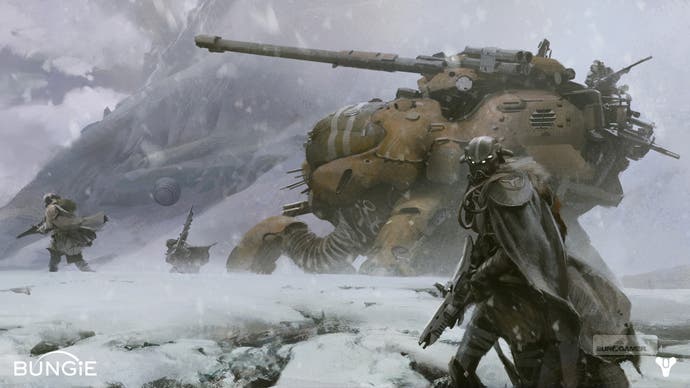
Here's O'Donnell's recollection of the meeting:
"I was handed this official packet, and they asked me to hand over my iPhone. At one point the legal representative in the room said, do you want to read this document? I'm like, no I'm just going to take it to my lawyers. So I'll see you later. But there were other people in the room who were also friends. None of us seemed happy. That's the way it felt to me. None of us were happy it had come to that point. But I was the one walking out.
"I had been told in that room I was going to get a call, either later that day or over the weekend, so we could come out together, Bungie and Marty could say something to let the public know what was happening. That never happened. That call never came. It still hasn't come."
O'Donnell handed in his key card and walked out of Bungie's Bellevue building. He said goodbye to friends, but there was no party. It was, he says, a sad moment.
Five days later, O'Donnell, via Twitter, announced he'd been fired. It was a tweet issued on the advice of his lawyers. There was some concern that by continuing to list Bungie as his employer on social media sites such as Facebook, he was causing some offence. So the button was pushed.
"I'm still sad to this day," O'Donnell says. "Many relationships have been changed because of this. I wish it hadn't happened. I wish it hadn't come to that point. I'm still confused as to why it had to be handled the way it was handled. People at Bungie at the time thought they were handling it the correct way. Obviously I disagreed, and that's why we had the arbitration."
The arbitration - a messy lawsuit that exposed Destiny's troubled development to the world - revolved around money, as these things tend to. O'Donnell, as one of Bungie's "grizzled ancients", had a substantial stake in the company, which he felt he was wrongfully denied when he was "terminated without cause". Bungie disagreed. It went to court, where O'Donnell targeted Harold Ryan and the company he loved. He won.
It wasn't long after he was fired that O'Donnell co-founded Highwire Games alongside fellow Bungie alum Jaime Griesemer. Griesemer left Bungie in 2011 having been the architect of Halo's famous "30 seconds of fun" gameplay loop, and one of just a handful of people who devised Destiny in secret as Bungie pumped out Halo 3: ODST and Halo: Reach for Microsoft.
"As soon as he you know what hit the fan, he was there that week, almost immediately he called me to say he was coming up to talk to me and my wife," O'Donnell says.
"He was extremely supportive."
Highwire, as we speak, is working on Golem, a PlayStation VR game that sees the player assume the role of a child bedridden by a disability. It's nothing like Halo or Destiny. And, as you'd expect, working at Highwire, a developer of just 10 people, is a world away from working at Bungie, a developer of, at last count, 750 people.
You might have thought Marty O'Donnell and Jaime Griesemer would, having agreed to make a new game together, fall inevitably into the familiar comfort of a first-person shooter. But that's exactly what the pair wanted to avoid.
"One of the first things Jaime said when he said let's do something together was, whatever we do, I don't want to be saving the galaxy again," O'Donnell says. "And that was fine."
It's an attitude that rekindles memories of O'Donnell's jazz-inspired soundtrack to Halo 3: ODST, or, as I like to call it, the Kid A of Halo games.
"It's rooted in the earth," he explains. "We want it to feel real, but you play as this child who is handicapped, but is able to control golems, which could be anything from a six-inch tall doll, to a 20 foot tall stone giant who comes from a mysterious city that's not far from you."
Amid our talk of his departure from Bungie, O'Donnell brings up his Ivory Tower. This was a kind of running joke at Bungie. "Marty's off in his Ivory Tower," they'd say, referencing his fancy audio studio. It was a phrase so common, Halo 2's designers named a multiplayer map after it, an in-game homage to his luxurious digs. When Bungie moved into its current office in Bellevue, O'Donnell had nine audio studios. Three dimensional, wood carved block letters, displayed over his in-house studio, spelled out the words: Ivory Tower.
"Marty's off in his Ivory Tower." An insight, perhaps, into O'Donnell's place in Bungie's unique culture. O'Donnell, the one with all of the awards, the most famous member of Bungie, sat in his Ivory Tower, jetting off every now and then to work with Paul McCartney on a song Bungie now distances itself from, while mission designers, map makers and gun tweakers battle in the trenches.
For his part, O'Donnell says his approach is to take responsibility for failures and to point to his colleagues in the face of praise. This, he says, is why the release of Destiny was so troubling for him. Destiny, a game criticised by so many for its lack of content, its lack of anything approaching a cohesive story, but with music that so obviously poured forth from the piano-playing fingers that brought us that wonderful, rousing Halo refrain.
"It was weird," he says of the launch of Destiny in September 2014. "Especially when there was a lot of critical praise for the music and audio. That was a difficult time because it was really hard to know exactly what to do with all that. I'm proud of the work the guys did. It's an amazing game. I know how much work was put into it. It's an amazing feat. But I don't even know how to judge it because of what I went through. So I prefer not to make any judgements about it."
Was Peter Dinklage's Destiny voice-over Marty O'Donnell's fault, I ask.
"You know what that question's like?" O'Donnell laughs. "It's like, have you stopped beating your wife? There's all sorts of pre-judgement in your question."
Then an answer that only brushes the truth of O'Donnell's feeling.
"I think Peter Dinklage is spectacular," he says. "I really do. I loved working with him. I didn't work with him the whole way. There was a vision in my mind, and some others' minds, and I didn't get a chance to fulfil that vision on what the character of the Ghost would be. I was interrupted in my process. But the times I worked with Peter Dinklage, I thoroughly enjoyed myself. And I think he's a great guy and a great actor."
"That wizard came from the moon," poor Dinklebot spouted. A laughable line back then. Now, I lament its loss. And when Bungie ditched Dinklage for the more perky Nolan North, one of the few Destiny moments that made me laugh was snuffed out of existence. It was a line that reminded me of the silliness that often brightened up a cloudy day on a Halo ring: a quip from a soon-to-die UNSC soldier manning Master Chief's flank, or a high-pitched squeal from a Covenant grunt as my pistol popped its head into a shower of confetti and a cacophony of cheers from children.
"As audio director on the Halo games, that was a huge part of my job and I took it very seriously," O'Donnell says. "Working with Joe Staten and how we finally came up with the personality of the grunts, even on Halo 1, that was an unplanned magical moment. And the AI dialogue of your friendly marines and the way that developed over the years, that was great.
"And I also thought those were the kinds of moments where we had a tacit agreement with our fans where we were going to continue to give them that kind of content with Destiny. So, there you go."
O'Donnell, I suspect, is keen to put the past behind him and focus on Golem and the Echoes of the First Dreamer Kickstarter. It is a chance for O'Donnell to finally release a video game musical prequel after his previous effort was consigned to Bungie's virtual cutting room floor.
And yet, there's hope Music of the Spheres will one day be released, despite O'Donnell being barred from having anything to do with it.
"Yes! It absolutely will come out," he says.
It turns out, much of the eight-movement symphonic suite is available to listen to. 40 of the 48 minutes, to be exact. An intrepid Bungie fan dug into Destiny and its marketing material and worked out song titles, the track list and even the image used for the cover of the album, and popped it all on Soundcloud. O'Donnell was impressed, although he says the effort isn't quite accurate. "But it's amazingly close."
Before O'Donnell was fired, he printed enough Music of the Spheres CDs and gave them to enough people that he expects a leak of the entire thing at some point. But he'd prefer Bungie to release the album officially.
"It's been two years since I was terminated," he says. "I would like to move on and have this not be the main story. If there was a way to put some of this stuff to bed, to me it would be like, let's release Music of the Spheres and move on. So it's not something that's just dangling out there as a question.
"That seems like an easy one to me."
